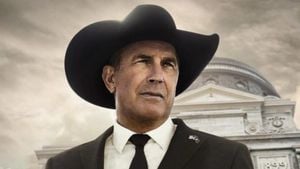Electric vehicles (EVs) have been at the forefront of discussions around climate and energy in recent years, but the possibility of another Trump administration is raising serious questions about the future of the industry. With Donald Trump back on the campaign trail, promising changes to U.S. policy, automakers are anxious about what his next term could mean for electric vehicles. A new analysis suggests it might not only impact EV production but could also deal significant blows to federal incentives encouraging consumers to buy EVs.
The electric vehicle market has evolved dramatically over the past decade. Back in 2015, the options were limited, but as of now, consumers enjoy plenty of choices ranging from compact models to three-row SUVs with impressive ranges. Still, there's growing apprehension about what might happen if Trump is back at the helm. Individuals familiar with electric vehicle policies fear a rollback on the federal EV tax credits, which could significantly impact sales and production planning.
The Inflation Reduction Act (IRA), signed during the Biden administration, was lauded as one of the most extensive climate investments the U.S. has ever seen, offering several tax incentives for clean energy endeavors. Reports reveal more than 20 tax credits have rejuvenated the industry, providing funds for new factories, battery components, and other EV-related projects. Tennessee itself has witnessed nearly $12.6 billion invested since the IRA's passage as clean energy projects have taken off.
Under Trump's direction, his transition team is reportedly considering the elimination of the $7,500 tax credit for consumers purchasing new electric vehicles. Analysts note this move could cause significant harm—not just to the sales of the Detroit automakers but also to Tesla, which has thrived thanks to such incentives. While Tesla may find itself less impacted due to its scale and cost advantages, other automakers depend heavily on these tax credits to make their EV models more attractive to consumers.
Harrison Godfrey from Advanced Energy United explains the interconnected nature of incentives: manufacturers need consumer-facing incentives to create demand for their products. Without buyers at the end of the assembly line, profits from substantial investments could dwindle, resulting in consequences far beyond just EV sales. Reports indicate multiple bills aimed at rescinding some aspects of the IRA have already been considered, but there remains pushback from some congressional members wanting to maintain these energy tax credits.
While automakers might be steeling themselves for changes, some states are proactively working to safeguard their EV markets. California and others have consistently pushed to maintain higher standards, requiring manufacturers to sell increasing amounts of zero-emission vehicles. The Advanced Clean Car II standards adopted by California's authorities aim for all automakers to sell solely electric or fuel-cell vehicles by 2035. If federal standards loosen under Trump, California may still rely on state regulations to keep the momentum going.
There are concerns about what this uncertainty could mean for auto workers and their jobs, too. The automotive industry has undergone massive changes over the past decade, and factors like shifting trade laws and changing consumer preferences can trigger volatility within the market. Some states are stepping up to bolster incentives for consumers and manufacturers alike, ensuring new sales and job growth opportunities.
One major topic driving this conversation is how foreign companies are gaining ground on American automakers by offering competitive vehicles. While protections and tariffs might seem like short-term answers, the profits for American companies could dwindle if they don't innovate or pivot quickly enough. Currently, EV sales are thriving around the world, particularly in Europe and China, with figures indicating 50% of new cars sold being electric vehicles. Comparatively, the U.S. trails behind but maintains strong growth nonetheless.
Despite all the uncertainty, many industry experts predict the transition toward electric vehicles will continue, albeit with potential slowdowns. A clear message has emerged from recent trends: consumers want quality electric vehicles, and automakers must respond regardless of federal hurdles. While Trump may have aspirations of rolling back environmental regulations, the lure of consumer demand drives significant decisions made by manufacturers.
Moving forward, the questions revolve around policies and their impacts, especially for automakers who have committed heavily to EV investments. How do automakers adapt to these changes? With key stakeholders within the industry recognizing the push toward EVs as necessary for their future and stability, the overall direction seems locked, even if the pace might vary depending on policy decisions to come.
It's evident the minute-to-minute political conversation around electric vehicles is complex. Right now, the extent of the damage promised from Trump’s policies hangs heavily on the future of EVs. Consolidation of efforts from various groups championing clean transportation is pivotal to maintaining sync with consumer demand as the world shifts toward more sustainable alternatives.
All eyes will be on the auto industry and the policies set to reshape its future, allowing consumers to decide whether they will embrace electric vehicles amid the backdrop of changing federal guidelines and political maneuvering. The story of electric vehicles seems far from over, and whether they thrive or merely subsist, one thing is for sure: they are here to stay, even if the winds of change are unpredictable.



